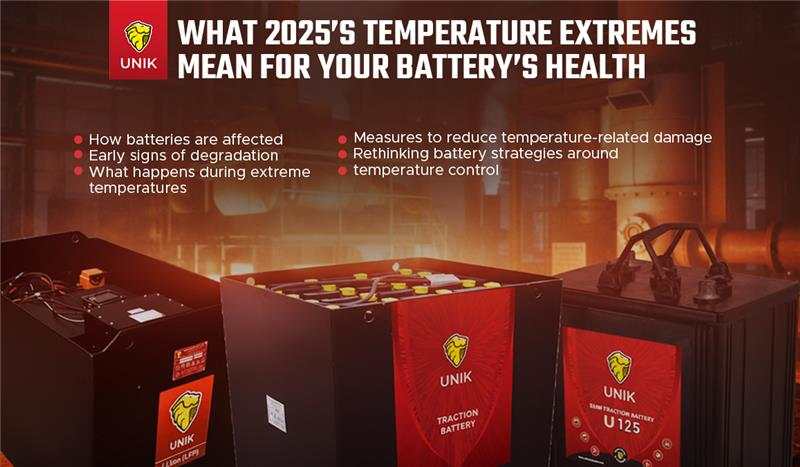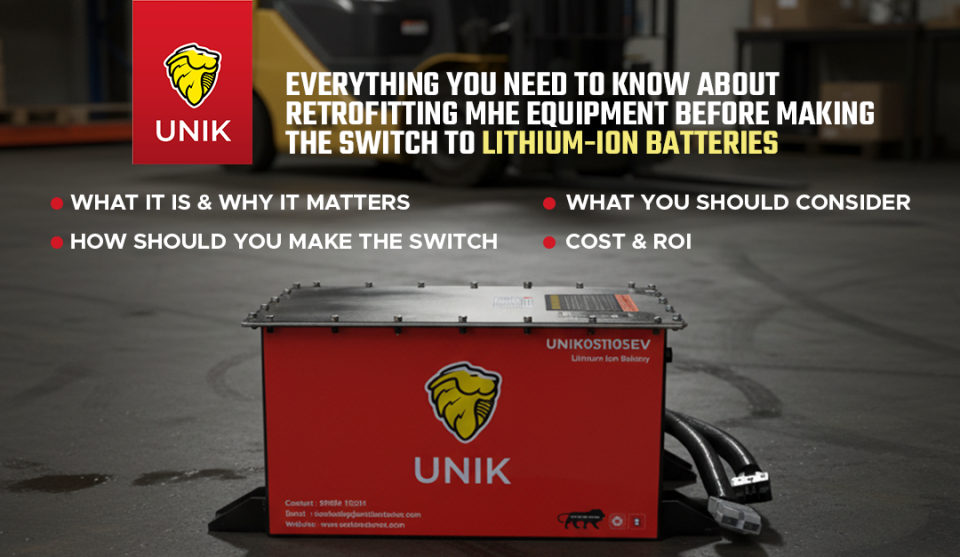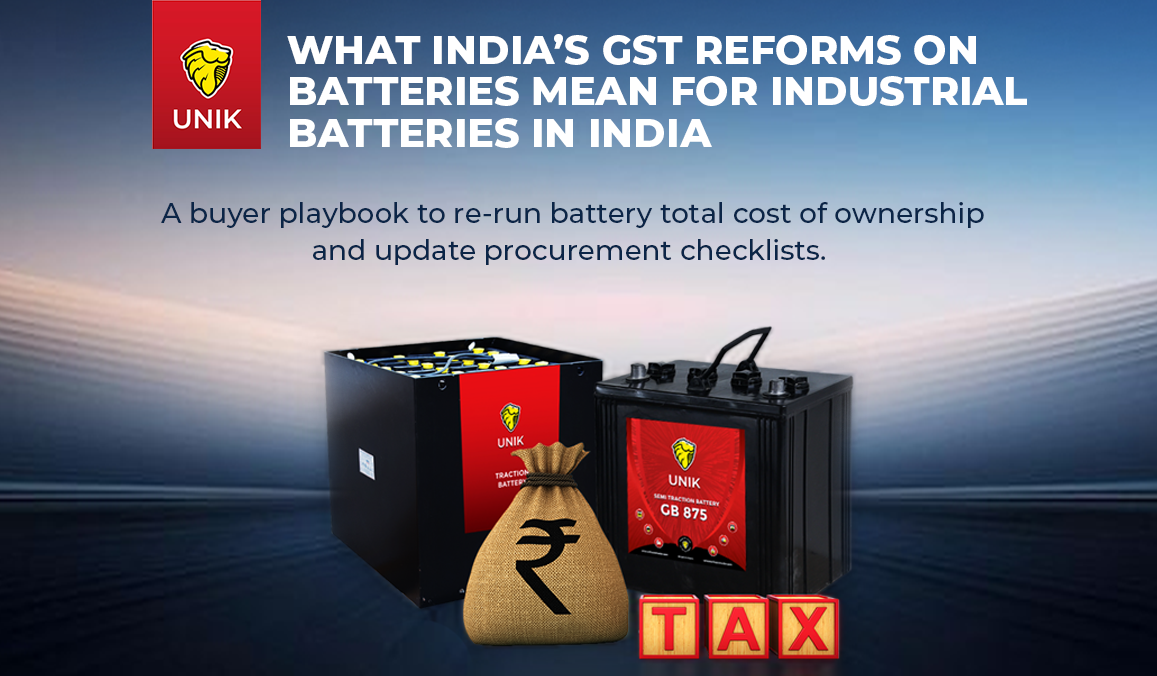Solar Batteries for Factories— A Step Towards Reducing Industrial Carbon Footprint
Every April, World Earth Day reminds us of our responsibility to protect the planet. This year, addressing climate change is more critical than ever as global average surface air temperatures for March (2024) hit a record high of 14.14 degrees. According to the International Energy Agency, industrial emissions are at an all-time high, at a staggering 37.4 billion tones (in 2023).
Solar power represents a significant opportunity for manufacturers to reduce their environmental impact with lower carbon emissions and dependence on fossil fuels.
At UNIK we have been exploring how integrating
solar batteries into your facility's solar voltaic (PV) system can be a significant step towards a more sustainable future.
Why Choose Solar Energy Systems for Your Industries?
Beyond reducing their carbon footprint and boosting sustainability, solar energy systems for industries offer many advantages, especially in tropical nations like India. These regions bathe in year-round sunshine, making solar power a future-proof, long-term investment.
While the upfront cost of installing
photo-voltaic systems may seem high, the price of
solar technology has been steadily dropping in recent years encouraging medium- and small-scale industries to embrace this clean energy source.
Some of the other advantages include-
- Reduced dependence on the grid power supply safeguards operations from outages and downtime.
Solar-powered industries can set up shop in remote regions where the grid supply may need to be better established.
- Solar technology reduces cost fluctuations, as grid supply price volatility no longer impacts manufacturing costs. Moreover,
solar systems are a one-time investment that provides uninterrupted and free power for approximately
10-20 years.
- The Indian government strategically supports investment in solar power. Businesses can leverage attractive tax breaks and accelerated depreciation allowances on solar technology systems, reducing their overall tax burden. Additionally, net metering policies provide an opportunity to generate revenue by selling excess
solar energy back to the grid.
- Lastly, opting for renewable energy power drives up property valuation, improves attractiveness for investors and creates branding opportunities for companies.
While solar power offers many advantages for industries, integrating photo-voltaic panels with solar batteries unlocks a whole new level of efficiency and versatility for your setup.
The next section of this blog deep dives into solar systems with batteries.
How Do Solar Systems with Batteries Work More Efficiently?
Solar batteries act as the cornerstone of a truly optimised solar energy system. By capturing excess electricity generated during high sunlight, they ensure a consistent and dependable power supply, even during extended periods of cloud cover or night hours. The electrochemical processes within the batteries store this surplus energy as potential energy, allowing for its convenient conversion back into usable electricity when needed.
The Types of Solar Batteries
Lead-acid and lithium-ion batteries are the two most popular batteries for solar cells. Each has distinctive merits and applications.
Lead Acid Batteries
For industries with solar energy systems prioritising affordability and reliability, lead-acid batteries remain a strong contender. These time-tested batteries come in flooded or sealed varieties, each suited for different discharge patterns (shallow or deep cycle). While newer technologies offer higher energy density, lead-acid batteries' advancements in lifespan make them a viable option for several industrial applications.
Lithium-ion Batteries
Lithium-ion batteries are a recent innovation in solar energy storage. While their high energy density allows for smaller and lighter units, coupled with efficiency for deeper discharge, this advanced technology comes with a significantly higher upfront cost.
Factors to Consider While Selecting a Solar Battery for Solar Panels
Selecting suitable solar batteries is a multi-faceted decision. Here are some criteria that should be considered while planning solar energy systems for industries-
Battery Lifespan
Battery lifespan is influenced by maintenance, type, quality, and depth of discharge. Referring to the manufacturer's specifications helps determine a solar battery’s expected life cycle. Additionally, proper maintenance practices can significantly enhance performance and longevity.
Lead-acid batteries typically last 1-10 years, depending on usage patterns. While lithium-ion batteries boast a longer lifespan, the total cost of ownership must be considered when evaluating options.
With their lower upfront cost, lead-acid batteries may be a more cost-effective solution for specific
photo-voltaic applications.
Depth of Discharge
Depth of Discharge (DOD) is the amount of stored energy used before your solar batteries’ recharge is needed. Deeper discharges typically lead to a shorter battery life. Most batteries provide a cycle life estimate (number of charge/discharge cycles) based on a specific DOD, along with a recommended maximum depth of discharge. When choosing a solar battery for a solar panel system, consider the battery's intended use. By matching the required DOD to your application, you ensure optimal performance and longevity for your investment.takes up floor space.
Cost & Capacity
While factoring in costs, one must consider the budget, the solar power system's long-term goals, the battery lifespan, and the replacement and maintenance expenses.
Selecting appropriate battery capacity is a critical decision when implementing solar technology. A well-sized battery bank directly influences its ability to store excess energy generated by your solar panel. This stored energy ensures a reliable and uninterrupted power supply, even during periods with minimal sunlight.
Usage & Applications
Consider whether your solar batteries need to provide short bursts of energy or sustain your plant for extended durations, your facility's daily sun exposure, and the depth of discharge best suited for your application.
Since no one-size fits all, answering these questions and consulting experts in solar energy systems for industries can help you make the right choices regarding battery type and capacity.
Energy Efficiency
Energy losses occur during the transfer and storage of collected solar power from panels to solar batteries. The efficiency of this process depends on the amount of energy generated and the system configuration.
Investing in high-quality, reliable batteries can mitigate these energy losses to a significant degree. .
Today, solar power with battery storage is not just about reducing your carbon footprint but also about securing a sustainable and cost-effective energy future for your factory. With low maintenance and reliable power generation, solar technology offers long-term benefits that pay off for your business and the environment. UNIK Batteries is dedicated to helping you reap the rewards of solar energy with our modular stationary and stationary battery solutions.
Contact us and explore how our batteries can help you achieve long-term energy sustainability goals.






